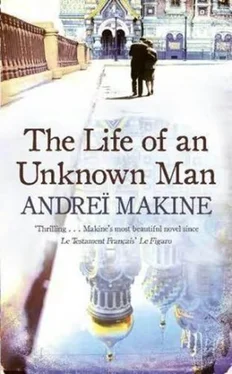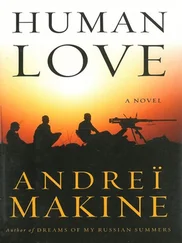Andreï Makine - The Life of an Unknown Man
Здесь есть возможность читать онлайн «Andreï Makine - The Life of an Unknown Man» весь текст электронной книги совершенно бесплатно (целиком полную версию без сокращений). В некоторых случаях можно слушать аудио, скачать через торрент в формате fb2 и присутствует краткое содержание. Жанр: Современная проза, на английском языке. Описание произведения, (предисловие) а так же отзывы посетителей доступны на портале библиотеки ЛибКат.
- Название:The Life of an Unknown Man
- Автор:
- Жанр:
- Год:неизвестен
- ISBN:нет данных
- Рейтинг книги:3 / 5. Голосов: 1
-
Избранное:Добавить в избранное
- Отзывы:
-
Ваша оценка:
- 60
- 1
- 2
- 3
- 4
- 5
The Life of an Unknown Man: краткое содержание, описание и аннотация
Предлагаем к чтению аннотацию, описание, краткое содержание или предисловие (зависит от того, что написал сам автор книги «The Life of an Unknown Man»). Если вы не нашли необходимую информацию о книге — напишите в комментариях, мы постараемся отыскать её.
The Life of an Unknown Man — читать онлайн бесплатно полную книгу (весь текст) целиком
Ниже представлен текст книги, разбитый по страницам. Система сохранения места последней прочитанной страницы, позволяет с удобством читать онлайн бесплатно книгу «The Life of an Unknown Man», без необходимости каждый раз заново искать на чём Вы остановились. Поставьте закладку, и сможете в любой момент перейти на страницу, на которой закончили чтение.
Интервал:
Закладка:
All that was left in his attic now was a few cardboard boxes, a bag of Léa’s clothes, and two piles of books. Occasionally Shutov would open a volume, leaf through it: people falling in and out of love, pain and pleasure, wisdom slowly gained and, at the end of the day, useless. Little psychological dissertations the French call “novels.”
He could have written one of these slight works himself. Picturing Léa sometimes as a female Rastignac, sometimes as a fallen woman rescued by a wanderer with a heart of gold. What else could he invent? A little girl gone astray in the jungle of the capital, a cynical young woman on the make, a sleeping Madonna bathed in moonlight… A provincial woman corrupted by Paris, a Galatea awakened by her Pygmalion. All plausible but false.
There was more truth in that brief glimpse he had: wriggling through his skylight up to the waist, Shutov watched Léa and her friend crossing the courtyard, carrying the coffee table, and could see the rear of a car parked in the street. An evening in May, this young couple departing toward a luminous sequence of roads and journeys, toward the unpredictable abundance of tiny joys that is life. He felt a lump in his throat (how many times had he mocked authors who used that expression) and could have given all he possessed for this newfound love to be a happy one! The young people set the table down on the sidewalk, the boy opened the trunk. And that was when Léa looked up and her gaze, hesitant at first, focused on the attic and the skylight… Shutov hid rapidly and remained bent double for a moment, panting as if he had been running, ashamed of having gained entry into a life where he no longer existed.
Now a bitter contentment inhabited him: the relief of no longer desiring anything, of having so few objects around him, of experiencing no jealousy. Of no longer having to fight.
He could have lived in this peace of renunciation for a long time. But a week later Léa telephoned him and asked if she could come by the following day to complete the move. “It really will be the very last time!” she said, reassuringly.
The very last time… “Dying,” he thought, “begins with ambiguous little phrases like this, well before any physical extinction.” He went over to the corner where Léa’s things were stacked, crouched down, stroked the silk of a blouse. And sensed deep within himself someone who still wanted to desire, to love… “Not to be taken for an old piece of furniture!” this other one cried out. To be able to kiss a woman’s arm as she slept.
But above all, after that telephone call, he realized that he would not have the strength to be present at his own funeral in an attic that was about to be emptied of everything that was his life.
These are names more mysterious than hieroglyphs on a papyrus eroded by millennia. Out-of-date addresses, curiously brief telephone numbers. A whole lapsed world Shutov is trying to bring back to life as he leafs impatiently through the pages of a notebook retrieved from the depths of an old traveling bag. The bag he had with him when he left Russia twenty years ago… A papyrus, yes, the comparison is no exaggeration: since then a country has disappeared, cities have changed their names, and the faces conjured up by the addresses survive only in Shutov’s memory.
He glances at the window, which is starting to turn pale. He has made his decision. At ten o’clock in the morning Léa will come with her friend and they will find no one here. The visa in his passport is still valid. He will go at once, as soon as he has found her address, the one who… A silhouette outlined by the autumn sun against the golden leaves.
She was called Yana. At the end of her studies she left Leningrad to go and work beyond the Urals. This he knows. Nothing more. The addresses in this notebook, like an encoded message, may perhaps lead him to this woman: a sequence of friends, who, stage by stage, may indicate the places where she made her home during that abyss of years.
One of them lives in western Siberia. Shutov telephones him, apologizes for calling him practically in the middle of the night, then realizes that over there, beyond the Urals, the sun is already at its zenith. What amazes him more is that the friend in question should be so little amazed. “I see, so you’re calling from Paris. I was there with my wife in April… Who? Yana? I think she taught at Tomsk University…” Shutov works through other numbers, talks to strangers, passes through three, five, ten time zones… But it is the surprise of that first conversation that remains the greatest: a man of his own age in a town in Siberia, responding as if there were nothing unusual in this, life goes on, and a couple of months earlier this former fellow student could have run into him in Paris.
Several sheets of paper lie before him, blackened with figures. He reaches the Far East and in Vladivostok a child’s voice calls a grandmother to the telephone, a student at Leningrad University in the same year as Shutov, thirty years ago. “So I’m old enough to be a grandfather,” he says to himself, conscious that his own exile had banished him from the chronology of human beings. His friends were living their lives, marrying, surrounding themselves with children and grandchildren, while he was transforming himself into an ageless ghost.
“Listen, Shutov, I know she went back to Leningrad, well, Saint Petersburg. She’d married a fellow who was in oil. Yes, you get the picture. And it didn’t work out… No, not the oil. The marriage. Wait, I’ve got her best friend’s number. She’ll be able to help you…”
Five minutes later Shutov is writing down the number of Yana’s cell phone. Digits that magically encompass the shade of a remote feminine presence, days filled with autumn gold, declarations never hazarded.
It is half past eight in Paris, half past ten in Saint Petersburg. Shutov dials the number, but just before it rings he hangs up, goes into the bathroom, thrusts his face beneath the cold-water tap, splashes himself, drinks, clears his throat. Then smooths down his wet hair in front of a mirror. He feels the hallucinatory clarity descending upon him that comes from a sleepless night, extreme tension, drink overcome. The sensation of being about to hurl himself into a void, like in the old days, when bailing out of the cabin of an aircraft, but without the parachute’s reassuring weight.
He dials again. In Saint Petersburg a cell phone comes to life. A male voice, strangely rhythmical at first: “The prime minister’s Boeing has just landed. Southern districts of the city will experience extreme traffic disruption…” A woman’s voice, closer: “Yes. It’s to your left just beyond the bridge. But steer clear of the Nevsky…” After a moment Shutov realizes that the male voice is that of a newscaster and that the woman’s voice is speaking to the driver of a car…
“Hello, what? Oh, Ivan! I was thinking about you only the other day and do you know why? Hold on, I’m just going to park…”
This interruption allows Shutov to gather his wits, to make a landing, he thinks. His feet touch the ground, the parachute drags him along, then the canopy collapses, deflates on the grass and now, at last, certainty imposes itself: safe and sound.
“Yes, my son came across your name on a website for French books. He does publicity for a publishing house. He was surprised to see a Russian name. I told him we used to know one another…”
The banality of these words is disconcerting. Even wounding. Shutov feels it like a pinprick: nothing serious and yet it jars. He interrupts the person who has not yet become Yana: “You see, I’m coming to Lenin-Saint Petersburg, today.”
“Oh, what a shame!”
The disappointment is sincere.
“How do you mean? Don’t you want us to meet?” Shutov’s tone is almost aggressive.
Читать дальшеИнтервал:
Закладка:
Похожие книги на «The Life of an Unknown Man»
Представляем Вашему вниманию похожие книги на «The Life of an Unknown Man» списком для выбора. Мы отобрали схожую по названию и смыслу литературу в надежде предоставить читателям больше вариантов отыскать новые, интересные, ещё непрочитанные произведения.
Обсуждение, отзывы о книге «The Life of an Unknown Man» и просто собственные мнения читателей. Оставьте ваши комментарии, напишите, что Вы думаете о произведении, его смысле или главных героях. Укажите что конкретно понравилось, а что нет, и почему Вы так считаете.









